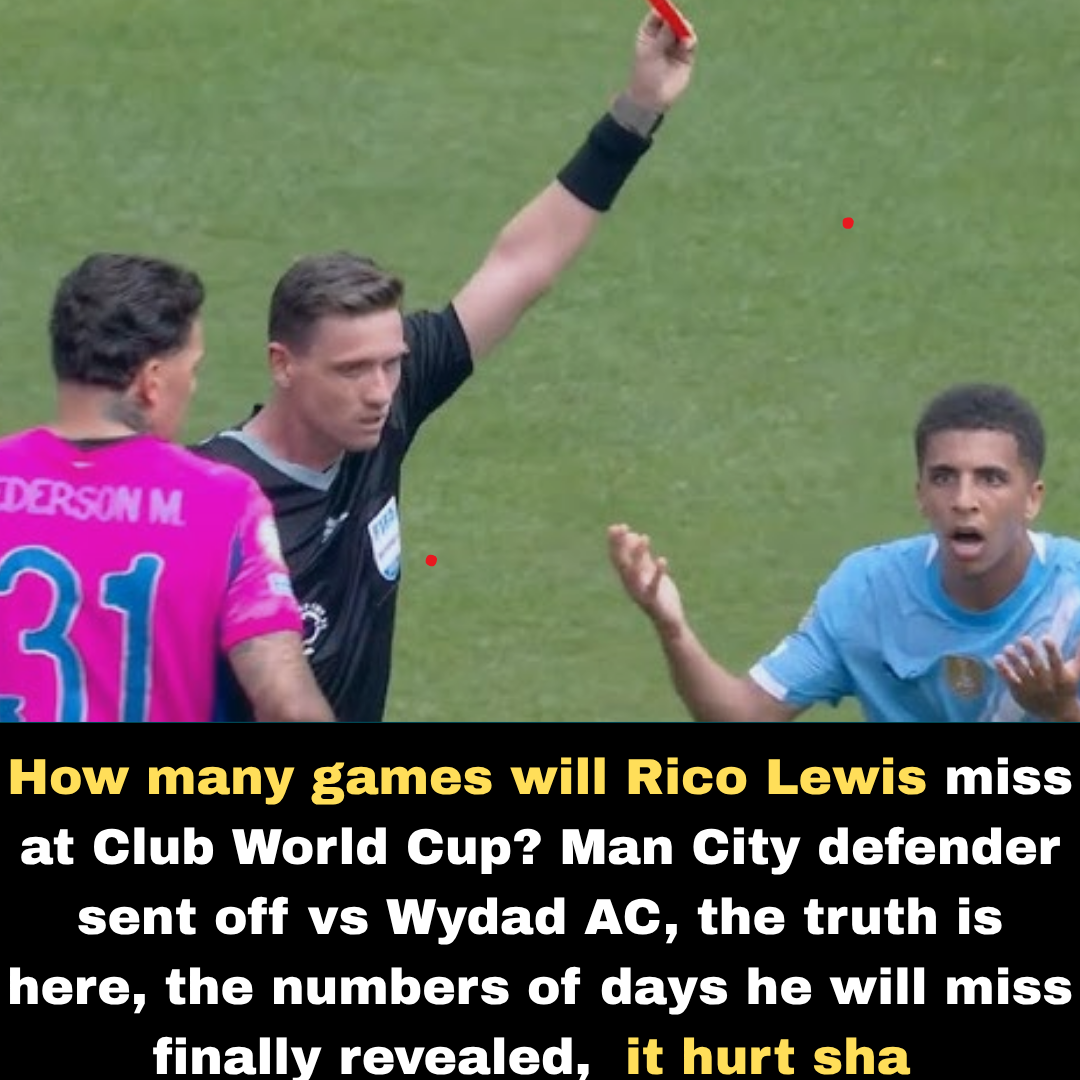Rico Lewis Red Card Controversy: Manchester City Face Club World Cup Challenge After Defender’s Suspension

Manchester City’s promising start to the FIFA Club World Cup 2025 has been overshadowed by a controversial red card that will see young defender Rico Lewis miss their crucial upcoming fixture. The 20-year-old’s dismissal in the closing stages of City’s 2-0 victory over Wydad AC has sparked debate about the severity of the decision and its potential impact on Pep Guardiola’s tournament ambitions.
The Incident That Changed Everything
The pivotal moment came in the dying minutes of what had been a commanding performance from Manchester City in Philadelphia. With the scoreline comfortably in their favor at 2-0, Lewis appeared to make what initially seemed like a perfectly legitimate defensive challenge. The English defender slid in to dispossess Wydad’s Samuel Obeng in a tackle that, from the outset, appeared to be timed well and executed fairly.
However, the aftermath of the challenge proved to be Lewis’s undoing. His follow-through caught Obeng in the head, a consequence that referee Ramon Abatti deemed serious enough to warrant a straight red card. The decision immediately drew scrutiny from City players and coaching staff, who believed the initial tackle was clean and that any contact with the opponent’s head was purely accidental and unavoidable given the nature of the challenge.
The Video Assistant Referee (VAR) system, which has become an integral part of modern football’s decision-making process, was called upon to review the incident. Despite extensive examination of the footage from multiple angles, VAR officials chose not to overturn Abatti’s on-field decision, confirming that Lewis would indeed be sent off and face the subsequent suspension.
The Immediate Consequences
Lewis’s dismissal means he will be unavailable for Manchester City’s second Group G fixture against Al Ain, scheduled to take place in the early hours of Monday morning at 2am UK time. This represents a significant blow to Guardiola’s tactical plans, particularly given that Lewis had been selected ahead of Matheus Nunes for the right-back position in the tournament opener.
The Portuguese midfielder Nunes, who had been among the substitutes for the Wydad clash, was introduced only in the final minutes of injury time, suggesting that Guardiola had specific plans for Lewis’s involvement throughout the group stage. The manager’s decision to start Lewis ahead of more experienced options demonstrated his faith in the young defender’s ability to perform on the tournament’s biggest stage.
Under FIFA Club World Cup regulations, a straight red card automatically results in a one-match suspension. However, tournament officials retain the discretion to extend this ban depending on the severity of the incident and any aggravating factors. While Lewis’s challenge appeared to be a genuine attempt to win the ball rather than a malicious act, the fact that it resulted in contact with an opponent’s head could potentially be viewed as serious enough to warrant additional scrutiny.
Rico Lewis: A Rising Star’s Journey
The suspension comes at a particularly frustrating time for Lewis, who has been working tirelessly to establish himself as a key component of Manchester City’s defensive setup. At just 20 years old, the defender has already demonstrated remarkable maturity and tactical understanding that belies his age, earning him regular opportunities in Guardiola’s first-team plans.
Lewis’s journey to this point has been marked by steady progression through City’s youth system, where his versatility and technical ability quickly caught the attention of the coaching staff. His ability to operate effectively in multiple defensive positions has made him an invaluable asset for Guardiola, who values tactical flexibility and the ability to adapt formations during matches.
However, this is not the first time Lewis has found himself on the wrong side of disciplinary action. His red card against Wydad AC follows a similar incident in the Premier League last December, when he was sent off during City’s draw at Crystal Palace. That previous dismissal highlighted some of the challenges young players face in managing the intensity and physicality of top-level football, where split-second decisions can have significant consequences.
The pattern of disciplinary issues may be a concern for both Lewis and his coaching staff, as developing the mental side of the game – including decision-making in crucial moments – is often as important as technical and physical development for young players.
Tactical Implications for Manchester City
Guardiola now faces the challenge of reorganizing his defensive setup for the Al Ain fixture without one of his preferred options. The Spanish manager’s tactical philosophy relies heavily on having players who can execute specific roles within his complex system, and Lewis’s absence will require careful consideration of alternative approaches.
Matheus Nunes appears to be the most likely candidate to step into Lewis’s role, having been the primary alternative for the right-back position in the opening match. The Portuguese midfielder’s inclusion in the squad for the Club World Cup suggests that Guardiola views him as a viable option for the defensive role, despite his more natural position being further forward.
However, Nunes brings a different set of attributes compared to Lewis. While both players offer pace and technical ability, their approaches to defensive positioning and attacking contribution vary significantly. Guardiola will need to adjust his tactical instructions to accommodate these differences and ensure that the team’s overall balance is maintained.
The manager might also consider alternative formations that could minimize the impact of Lewis’s absence. City’s squad depth provides several options, including the possibility of deploying a three-center-back system that could allow for different combinations of defenders and wing-backs.
The Broader Context of the Club World Cup
Manchester City’s participation in the FIFA Club World Cup 2025 represents a significant opportunity for the club to add another prestigious trophy to their collection. The tournament brings together the world’s best club teams, providing a platform for showcasing tactical innovation and individual brilliance on a global stage.
The competition’s format, with its group stage followed by knockout rounds, means that every match carries significant weight. City’s opening victory over Wydad AC was crucial in establishing their position in Group G, but the upcoming fixtures against Al Ain and Juventus will ultimately determine their progression to the knockout stages.
The tournament also offers substantial financial incentives, with reports suggesting that participating clubs can earn significant prize money based on their performance. For Manchester City, success in the Club World Cup could provide both sporting glory and financial rewards that would further strengthen their position in the global football landscape.
Team Dynamics and Squad Management
The absence of Lewis provides an opportunity for other squad members to demonstrate their capabilities and stake a claim for regular involvement. Guardiola has consistently emphasized the importance of squad depth and the need for all players to be ready to contribute when called upon.
This philosophy becomes particularly relevant during tournament football, where the compressed schedule and high intensity of matches can lead to fatigue, injuries, and suspensions. The ability to rotate players without significantly compromising performance levels is often the difference between tournament success and early elimination.
The Lewis situation also highlights the challenges of managing young players in high-pressure environments. The Club World Cup represents one of the most prestigious competitions in world football, and the pressure on players to perform can be intense. For young defenders like Lewis, learning to manage this pressure while maintaining the aggressive, committed style that brought them to this level is a crucial part of their development.
VAR and Modern Football Decision-Making
The involvement of VAR in confirming Lewis’s red card raises broader questions about the role of technology in modern football decision-making. While the system was introduced to eliminate clear and obvious errors, its implementation has often led to lengthy delays and controversial decisions that divide opinion among players, coaches, and fans.
In Lewis’s case, the VAR review confirmed the referee’s initial decision, suggesting that the technology supported the view that the challenge warranted a red card. However, the subjective nature of such decisions means that different officials might reach different conclusions when reviewing the same incident.
The consistency of VAR decisions across different competitions and jurisdictions remains a topic of ongoing debate within football. What might be considered a red card offense in one tournament could potentially be viewed differently in another, creating uncertainty for players and coaches about the boundaries of acceptable play.
Looking Ahead: Al Ain and Beyond
Manchester City’s next challenge comes against Al Ain, a fixture that will test their ability to adapt to Lewis’s absence while maintaining their pursuit of tournament success. The UAE-based club represents a different type of challenge compared to Wydad AC, with their own tactical approach and playing style that will require careful preparation from Guardiola and his coaching staff.
Victory against Al Ain would likely secure City’s progression to the knockout stages, given their superior goal difference and the quality within their squad. However, football has a way of producing unexpected results, particularly in tournament settings where motivation and preparation can be as important as raw talent.
The final group stage fixture against Juventus promises to be the most challenging test of City’s credentials. The Italian giants bring their own rich history and tactical sophistication to the tournament, and their match against City could well determine the group winner and potentially influence the knockout stage draw.
Disciplinary Records and Player Development
Lewis’s red card against Wydad AC, combined with his previous dismissal against Crystal Palace, suggests a pattern that the young defender will need to address as he continues his development. While aggressive defending is often a positive attribute, learning to channel that aggression appropriately is crucial for any player aspiring to compete at the highest level.
The coaching staff at Manchester City will undoubtedly work with Lewis to analyze both incidents and identify areas for improvement in his decision-making. This type of mentoring is particularly important for young players who are still developing their understanding of the game’s nuances and the fine margins that separate legal challenges from disciplinary action.
Modern football places enormous demands on defenders, who must be capable of making split-second decisions while under intense pressure from opponents and within the scrutiny of multiple camera angles and VAR review. The learning curve for young players navigating these challenges can be steep, but it is an essential part of their development toward becoming complete professionals.
Tournament Regulations and Future Implications
The FIFA Club World Cup’s disciplinary regulations are designed to maintain competitive integrity while ensuring that minor infractions don’t disproportionately impact a team’s tournament prospects. The one-match suspension for Lewis represents the standard penalty for a straight red card, though more serious offenses can result in longer bans.
Interestingly, the tournament regulations include provisions for clearing yellow card accumulations after the quarter-final stage, meaning that players can only miss the final through a red card received in the semi-finals. This system recognizes the prestige of the final and seeks to ensure that the tournament’s climax features the best available players from both teams.
For Manchester City, managing their disciplinary record throughout the tournament will be crucial to maintaining squad availability for the latter stages. The intensity of knockout football often leads to increased physical challenges and higher stakes, making discipline an even more important factor as the tournament progresses.
Conclusion: Resilience and Adaptation
Rico Lewis’s suspension from the Al Ain fixture represents a significant challenge for Manchester City, but it also provides an opportunity to demonstrate the squad depth and tactical flexibility that have become hallmarks of Guardiola’s tenure. The young defender’s absence will be felt, but the club’s investment in squad development and tactical versatility should provide adequate solutions.
The incident serves as a reminder of football’s unpredictable nature and the fine margins that can influence major tournaments. While Lewis will be disappointed to miss such a crucial fixture, the experience will likely contribute to his long-term development as both a player and a professional.
As Manchester City prepare for their upcoming challenges in the Club World Cup, they do so with the knowledge that their success will depend not just on individual brilliance, but on their collective ability to adapt, overcome setbacks, and maintain their pursuit of excellence even when faced with unexpected obstacles. The Lewis suspension may prove to be a minor footnote in what they hope will be a successful tournament campaign, or it could serve as a catalyst for other players to step up and make their mark on the global stage.















